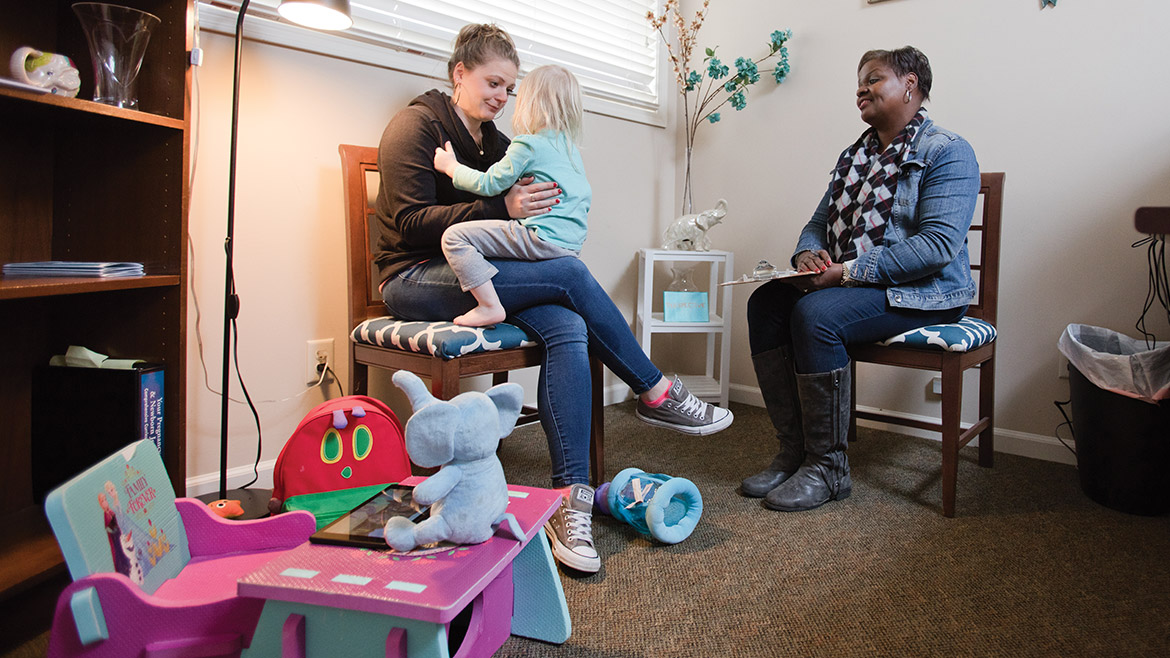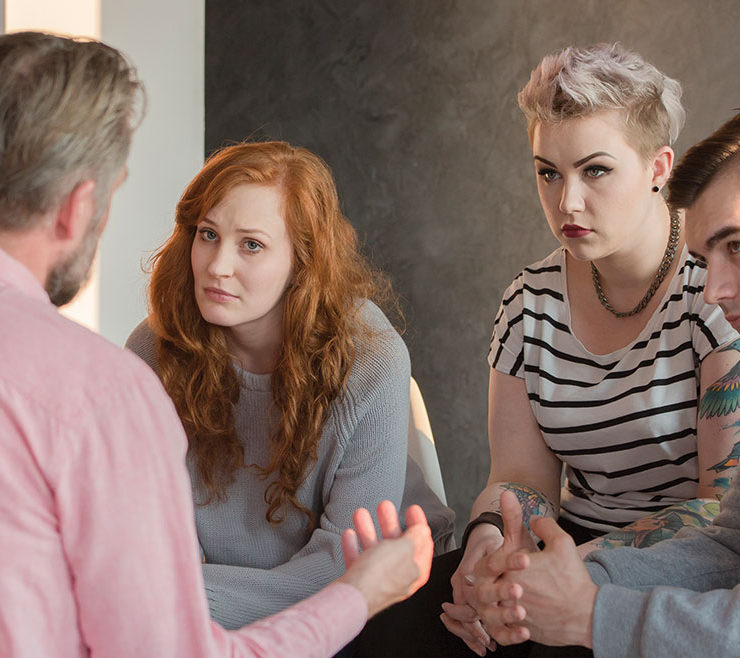
A national organization with a local chapter and a public health department with a city and county reach are partnering up and sharing resources to help further their shared mission: to create a healthy and prosperous community. Together, Heart of Missouri United Way and the Columbia/Boone County Department of Public Health and Human Services hope to make a big impact on health in Mid-Missouri.
One specific way they’re working together is through evaluating and classifying the community’s health needs through Community Health Assessments.
While not a new tool, the CHAs were revamped by the health department in 2013. Instead of solely relying on secondary data, the department wanted to add in the community’s voice and chose to do so through surveys and focus groups.
Andrew Grabau, executive director of the Heart of Missouri United Way, serves on the steering committee responsible for reviewing the health assessments. After looking over the information, the steering committee uses the health assessment to create action steps for improving the community’s health, which then becomes the Community Health Improvement Plan, also referred to as CHIP.
“The experience for me, serving on the steering committee, has been incredibly valuable on a number of levels,” says Grabau. “One, because we dovetail it with the work we’re currently doing. Two, it helps in guiding the future work we’re going to do.”
United Way shares their diverse connections to the community with the health department to ensure CHIP is inclusive and benefits everyone.
“We want to make sure, as a community, that there is a larger collective impact to the work that we’re doing,” says Grabau. “Being a part of the assessment helps us in being a part of that.”
The Changing Idea of Public Health
The initial 2013 health assessment brought up concerns such as inaccessible sidewalks and public transportation, focus areas that don’t usually come to mind when considering public health.
“What we’re seeing (in the health assessments) is not what we would think of as traditional issues that public health would address,” says Scott Clardy, assistant director of the Columbia/Boone County Department of Public Health and Human Services. “We’re being more innovative and more responsive to our community by addressing the issues they see.”
The World Health Organization defines health as “a state of complete physical, mental, and social well-being, rather than the mere absence of disease or infirmity.” This open definition lends itself to a more holistic concept of health. It implies that health sinks into every part of our lives, from our social media use to daily commutes.
This concept was supported in 2018 by the United Way’s four health initiatives: basic needs; mental health; medical and dental issues; and safe, healthy, and affordable housing. These health initiatives help determine where funding from the organization would go.
“There’s three recurring things that surface during all our different focus groups and all our different meetings around the health assessment,” says Grabau. “I’m hearing that mental health is a concern, basic needs are a concern, and affordable housing. This is what I’ve heard across all age ranges.”
“If those are the health concerns of the community, and those are the things that need to be addressed to increase the health of the community, then those are the things that we need to be working on,” says Clardy.
Community Affect
Lutheran Family and Children’s Services of Missouri wants to push the needle forward for community health through their work with youth. The organization addresses the mental and social factors of health by offering counseling services across age groups and specialized issues such as teen pregnancy and adoption.
A Heart of Missouri United Way funded agency, Lutheran Family and Children’s Services will receive $55,960 annually from 2017 to 2020. This financial support is part of Heart of Missouri United Way’s annual health impact allocations. The Heart of Missouri United Way and Grabau have a focused concern on mental health and how it’s tied to social isolation.
“What it means for an individual to not have that social capital — that is so important around everything that we do, not only mental health, but physical health,” says Grabau, “You can see where social isolation can be detrimental to anyone at any stage, from a young child all the way to a senior.”
The 2018 Status Report on Missouri’s Substance Use and Mental Health from the Division of Behavioral Health reports that there was an increase from 2015 to 2017 of 195 diagnosed anxiety disorder cases, 11 cases of diagnosed adjustment disorder, 67 diagnosed cases of impulse control disorder, and 10 cases of psychotic disorder. Increases occurred between 2015 and 2017.

Collaborating for Progress
A community focus and health crisis affecting almost every community across the country is the abuse of alcohol and illicit drugs. Boone County is no exception. The number of Boone County residents discharged from emergency rooms with an opioid diagnosis increased from 77 people in 2004 to 188 people in 2014.
Drug addiction and drug sales directly impact two of the 2018 health initiatives: safe, healthy, and affordable neighborhoods and mental health. That’s why some of United Way’s funding went to Phoenix Health Programs, an organization dedicated to providing treatment for people with drug and alcohol addiction.
In 2017, Phoenix Health Programs reported that 62 percent of their program participants’ illicit drug use decreased to zero percent over a six-month period. Program participants’ alcohol use decreased from 49 percent to 16 percent over the course of six months. For context, national opiate relapse rates without treatment hover around 90 percent, according to the National Institute of Mental Health.
In a 2018 CBT interview about Phoenix Health Programs, Heather Harlan, a prevention specialist and adolescent counselor at the organization, emphasized the importance of community support with progress.
“We’ve had employers bring employees in here with substance abuse problems to get them help and told us that their jobs will be waiting on them once they get better,” Harlan said. “Knowing that a job is waiting can really give people a lot of motivation to get better.”
The organization works as a community partner with both Heart of Missouri United Way and the Columbia/Boone Department of Public Health and Human Services. From 2017 to 2020, Phoenix Health Programs will receive $87,000 annually from Heart of Missouri United Way to put towards their enhanced opioid treatment for young adults. In 2017, the Heart of Missouri United Way allocated $443,994 total to health impact.
“There are health outcomes tied to after-school programs. There are health outcomes tied to financial counseling programs, to everything that we do. Just because we fund agencies under ‘health impact’ doesn’t mean that the other ones don’t have health targets,” says Grabau.
Overall, Phoenix Health Programs typically receives 78 percent of its funding from government entities, but 40 percent of that government funding comes specifically from the state of Missouri and local governments.
Today and Beyond
The partnership between Heart of Missouri United Way and Columbia/Boone County Department of Public Health and Human Services has elevated the community voices affecting change in the areas that need it most.
“The public health system is not the public health department,” says Clardy, “The public health system is all kinds of folks that are involved in caring for the health of the community.”
As it is the core of United Way, community is the core of health.
Heart of Missouri United Way – Health Impact 2017 Allocations
Goal: Promote healthy behaviors in our community.
Targets: Increase the number of community members who:
- Live a healthy lifestyle
- Eat well and are physically active
- Avoid substance abuse, smoking, and teen pregnancy
- Access physical, mental, and dental health care
Boys & Girls Club – $32,800
Great Futures Start Here: Triple Play Program — Body & Mind
City of Refuge – $32,364
Community Health Advocates Program and Refugee PTSD Counseling
Columbia Center for Urban Agriculture – $59,402
Opportunity Gardens
Family Counseling Center – $120,000
School-based Services and Outpatient Services
Family Health Center – $64,532
Children’s Dental Care Access and Cavities Prevention Program
Great Circle – $24,300
Impact US
Lutheran Family and Children’s Services – $55,960
Pregnancy and Parenting
Phoenix Health Programs – $87,000
Enhance Opioid Treatment for Young Adults




